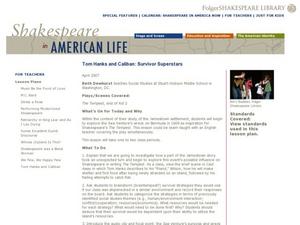Curated OER
Synonyms
Synonyms are very important words in the world of language arts. This PowerPoint serves as a review for those who have been exposed to synonyms. The interactive component of this presentation is quite good. Pupils must choose the correct...
Curated OER
Symbolism
Start your language arts lesson with this quick PowerPoint that defines symbolism. Following the definition is a sentence describing the American flag as a symbol to the United States. Tip: After reading these slides, have students write...
Curated OER
Poetry
Explore the semantics of poetry with this higher-level presentation. With examples from Dickinson, Frost, and Dr. Seuss, the slides clearly explain the details of poetic structure, license, and schemes. You could use this in a language...
Curated OER
CVC Puzzles
Words that use the consonant/vowel/consonant pattern are the focus of this language arts presentation. Students are shown a word that has the vowel missing and a picture representing the word. They have to choose one of the five vowels...
Curated OER
Capital Letters
When and how to use capital letters is the focus of this language arts presentation. The first slide gives the five most common rules for using capital letters. The rest of the slides give young readers lots of practice. Instant feedback...
Curated OER
Compound Words
This 14-slide language arts presentation does a credible job of introducing how compound words work. It gives learners many examples, along with pictures, to practice reading compound words. Nicely-done!
Curated OER
Reciprocal Reading
The strategies associated with Reciprocal Reading are outlined in this language arts presentation. Pupils discover what it means to be the questioner, the summarizer, the predictor, and the clarifier. All four strategies lead to...
Curated OER
Auxiliary Verbs
Auxiliary verbs are the focus of this language arts presentation. These types of verbs are very specific, and are taught quite effectively during the PowerPoint. Pupils are invited to do their own pieces of writing that use auxiliary...
Curated OER
The Lion, The Witch, and the Wardrobe - Direct Speech
Direct speech, and the use of quotation marks, are the focus of this language arts presentation. The story, The Lion, The Witch, and The Wardrobe is used to illustrate examples of direct speech and how quotation marks are used. The final...
Curated OER
Narrative Writing Tips
In this language arts presentation, you will find some excellent tips for your writers who are about to try their hand at narrative writing. Each of the eights slides presents quite a few good tips such as, "Long paragraphs can be...
Curated OER
Spelling - Adding -ing to Verbs
In this language arts presentation, learners are coached on the proper ways, and proper times, to add -ing to a verb. Clear instructions, and engaging examples are embedded in each slide. A very good PowerPoint to use when teaching this...
Curated OER
Student Opinion: How Impulsive Are You?
Sure to spark lively discussion in any Language Arts classroom, this article from The York Times asks the question, 'How much self-control do you have?'. Pupils begin by reading a short passage about a study on delayed gratification and...
K12 Reader
Elements & Atoms
Study matter in a new way with a cross-curricular assignment for language arts and math. Learners answer five reading comprehension questions after reading a few paragraphs about the periodic table, properties of elements, and how atoms...
K12 Reader
Adapting to Survive
Life science and language arts come together in a passage about animal adaptation. After kids learn about how organisms adapt to conditions in their environments, they complete five reading comprehension questions based on context clues...
Media Smarts
The Newspaper Front Page
Hot off the presses! A perfect instructional activity idea for a journalism class or even a language arts class looking to incorporate some informational texts. Young writers analyze the front pages of various newspapers to determine the...
Curated OER
Whom, Who, and Whose
Who can tell the difference? Teach your class how to use who, whom, and whose - once and for all! One page provides an easy-to-understand instruction sheet, and the second page prompts learners to practice their grammar with thirteen...
Curated OER
Fused Sentences (Run-on Sentences)
Run-on sentences can be annoying to read, and are a tough habit to break in writing! Fix this problem in your language arts class with this straightforward grammar worksheet. Pupils rewrite fourteen sentences to split run-on sentences...
Curated OER
Parallelism, Including Correlative Conjunctions and Comparisons
After reading the first reference page about parallel structure using correlative conjunctions, young learners rewrite nine sentences with errors in parallelism. Even the strongest writers in your language arts class could benefit from...
Curated OER
Word Pair Analogies 8
Working on analogies in your language arts class? Use this straightforward learning exercise to address common techniques and strategies used to solve analogies. This activity is a great way to review vocabulary and to reinforce logical...
Curated OER
Its or It's
What's the difference between its and it's? Clear up any misunderstandings in your third grade language arts class. Practice sentences use its or it's twice, prompting learners to use context clues for each usage. At the end of the...
Curated OER
Verb Tenses
Discover how to use proper verb tenses with context clues. Five sentences help first graders decide if they should use -ed or -ing to end simple verbs. Each sentence provides context clues to indicate the time. Use the resource in...
Curated OER
Instructions
Writing a recipe for how to make a banana split is the task assigned in this language arts resource. Learners must list the ingredients, then write the instructions for how to construct the dessert. They can look up the instructions in a...
Shakespeare in American Life
Tom Hanks and Caliban: Survivor Superstars
Here’s a clever way to combine language arts and social studies. Shakespeare’s The Tempest is believed to have been inspired by the wreck of the Sea Venture on Bermuda in 1609. The class views a brief scene from Castaway in which Tom...
Utah Education Network (UEN)
Evaluating the Format of Informational Text
Make your learners aware of the advantages and disadvantages of using different media in presentations. This straightforward resource evaluates media formations such as print, digital text, and videos. Although the subject of ballet is...
Other popular searches
- 5th Grade Language Arts
- 3rd Grade Language Arts
- 4th Grade Language Arts
- Second Grade Language Arts
- English Language Arts
- 1st Grade Language Arts
- Kindergarten Language Arts
- Language Arts Jeopardy Game
- First Grade Language Arts
- Language Arts School Projects
- Language Arts Lesson Plans
- Language Arts Games

























